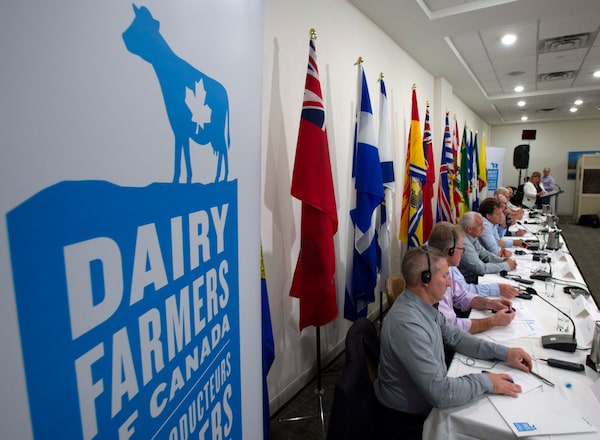
Representatives of provincial and national dairy producer groups held a news conference in Ottawa on Wednesday to tout the benefits to consumers of Canada’s protected milk market on Wednesday, Sept. 19, 2018.Adrian Wyld/The Canadian Press
Canada’s dairy farmers are urging the country’s NAFTA negotiators to offer no new market access to foreign milk, cheese or other dairy goods.
Representatives of provincial and national dairy producer groups held a news conference in Ottawa on Wednesday to tout the benefits to consumers of Canada’s protected milk market, and to warn of the hardships they say farmers will face if Foreign Minister Chrystia Freeland and her team of negotiators grant concessions to the United States to break the impasse in trade talks.
The main obstacles to a new North American free-trade agreement with the United States and Mexico are dispute-resolution mechanisms, cultural industry protections and U.S. efforts to export more dairy to Canada.
Canada shields its dairy farmers from foreign competition with a system of fixed prices, managed milk production and high tariffs.
About 10 per cent of Canada's dairy market has been opened to foreign products through trade agreements with Europe, the Trans Pacific Partnership and U.S. trade. This has cost the dairy industry $250-million a year in lost sales, the groups say. They fear new supplies of lower-priced milk and other dairy goods from much larger U.S. producers will drive farmers out of business and harm rural economies.
“This has been a difficult time for the Canadian dairy sector. The uncertainty surrounding our livelihoods is putting much stress on farmers, workers and our families,” said David Wiens, chairman of Dairy Farmers of Manitoba and a farmer in southeastern Manitoba. “Our life’s work seems to have been reduced to a bargaining chip in successive trade negotiations. NAFTA is only one of the most recent examples.”
Arlan Suderman, a commodities economist at U.S. brokerage INTL FCStone, said Canadian dairy concessions and changes to the resolution mechanisms used in the softwood lumber dispute are essential if a deal is to be reached.
“I think the biggest obstacle in the NAFTA talks is the egos at the top in the United States and Canada, between Trump and Trudeau,” Mr. Suderman said from Kansas City, Mo. “I think that increased access to the Canadian dairy market is going to have to be an essential part of an agreement that, over all, will be in Canada’s best interest.”
The Globe and Mail has reported Ottawa has offered U.S. dairies more tariff-free access but stopped short of dismantling the supply-management system that has been in place since the 1970s. Dairy farmers and industry observers, however, say erosion of farmers’ $6-billion market will lead to the gradual collapse of the system of fixed milk prices and controlled production.
“The dairy sector cannot be negatively impacted by another trade deal. Enough is enough,” said Pierre Lampron, a Quebec farmer and president of the Dairy Farmers of Canada.
Marie-Pier Vincent, who milks 40 Holsteins near Saint Hyacinthe, Que., said in an interview she would likely be forced to leave the business if more U.S. dairy entered Canada. Cuts to her sales and production would make it impossible to pay off the debts she incurred expanding her farm.
Ms. Vincent, who bought her milk operation two-and-a-half years ago from a retiring farmer, recently spent $8,000 on two more cows, about $50,000 on production allowances, and an automated feed system. “I’ve made some investments and it would be very hard to pay off…if they make some concessions,” said Ms. Vincent, who relies on a part-time job at another farm to pay her bills.
Dairy farmer Marie-Pier G. Vincent Dairy cows are fed at a farm in Saint-Valerien-de-Milton, southeast of Montreal.Christinne Muschi
Canadian dairy farmers became a target of U.S. President Donald Trump’s tweets shortly after the unpredictable and erratic leader visited Wisconsin, a state whose milk production exceeds that of Canada. Farmers there and elsewhere in the United States face economic ruin because of low prices and overproduction. Mr. Wiens said the Canadian market is not big enough to absorb U.S. dairy surpluses or withstand any new imports.
Farmers say the Canadian system assures consumers pay stable prices for high-quality milk that is hormone-free from cows that are well treated. However, it’s a system the Canada West Foundation says costs the average Canadian family an extra $600 a year for milk, cheese and other dairy products.
Eric Lascelles, an economist at Royal Bank of Canada, says supply management is not an “explicit subsidy” to farmers, but a “form of cartel” that uses its monopoly power to limit milk supplies with production quotas and tariffs and set an above-market price. “The extra cost is borne directly by the consumer,” Mr. Lascelles said in a research note.
“Let us acknowledge that in addition to the many advantages suppliers enjoy under this arrangement, Canadian customers benefit from stable prices. However, this positive is well outweighed by the negative of having to pay a significantly higher price,” Mr. Lascelles said.
 Eric Atkins
Eric Atkins